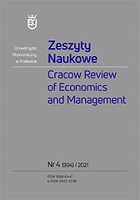Teoria płacy wydajnościowej przed Harveyem Leibensteinem
Efficiency Wage Theory prior to Harvey Leibenstein
Author(s): Dariusz GrzybekSubject(s): Economy, Labor relations, Socio-Economic Research
Published by: Wydawnictwo Uniwersytetu Ekonomicznego w Krakowie
Keywords: efficiency wage; labour theory; cognitive biases; classical economics; neoclassical economics;
Summary/Abstract: Objective: The article analyses the idea of efficiency wage before H. Leibenstein’s work from 1957 as an example of specific cognitive bias. The bias centers around the rejecting or neglecting of empirical data not in accordance with theories of mainstream economics. Research Design & Methods: The method used was comparative analysis of economics texts. Findings: The article shows that the concept of the efficiency wage was often neglected and marginalized, supposedly because it could have paved the way to unorthodox economic theory, and away from the dominant laissez-faire thinking of most ecomomists. H. Leibenstein shows a case in which higher wages implicate higher efficiency. This is the special case of low-paid workers, who in consequence are better nourished, thus gaining strengthen and vitality, which in turn makes them better labourers. Another factor in H. Leibenstein’s analysis was the motivating function of higher wages. Efficiency wage effects were known to economists as well as managers long before H. Leibenstein. Practitioners of efficiency wages have included R. Owen, Cadbury brothers and H. Ford, while more theoretical-oriented economists have included authors from A. Smith to A. Marshall. Implications/Recommendations: Efficiency wage theory was revealed and forgotten many times before H. Leibenstein. This phenomenon is an example of a well-known cognitive bias: neglecting evident facts that are incompatible with established theories and are thus treated as irrelevant anomalies. Contribution: Part of the analysis done for this article may become a part of a research programme showing ways economists make theoretical choices. This article will contribute to such a programme. Article type: original article.
Journal: Zeszyty Naukowe Uniwersytetu Ekonomicznego w Krakowie
- Issue Year: 995/2022
- Issue No: 1
- Page Range: 43-61
- Page Count: 19
- Language: Polish

